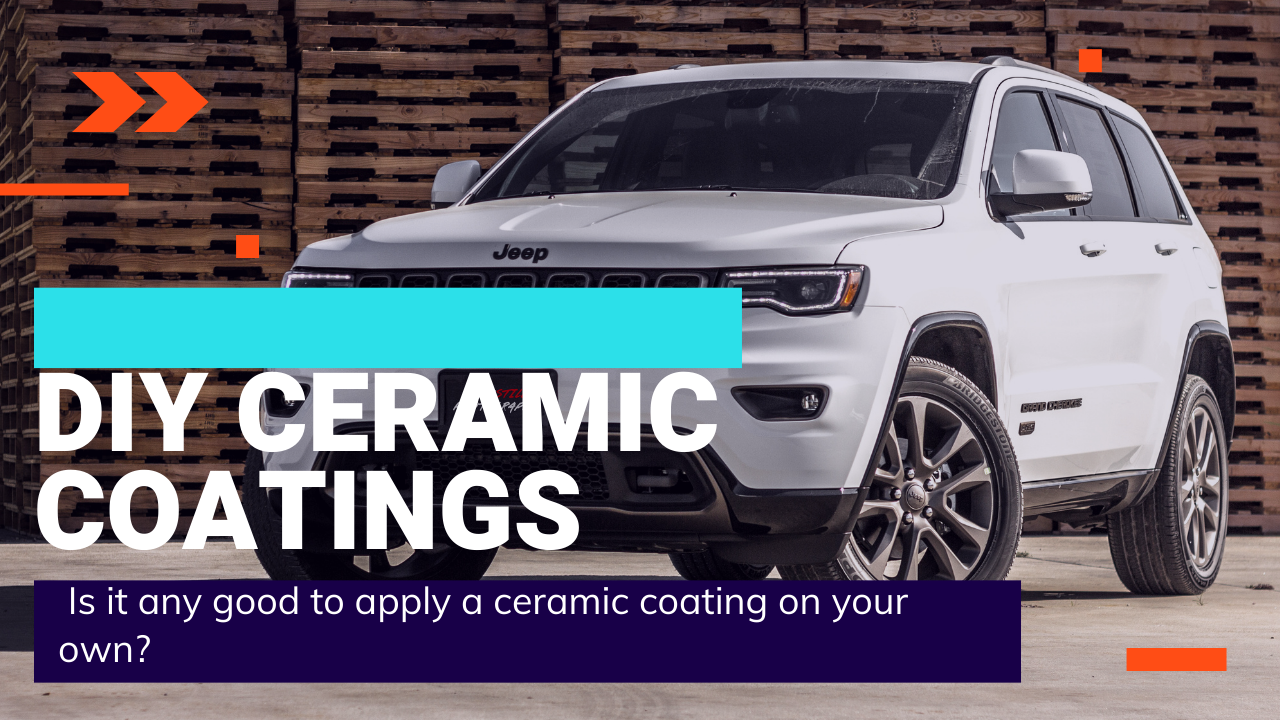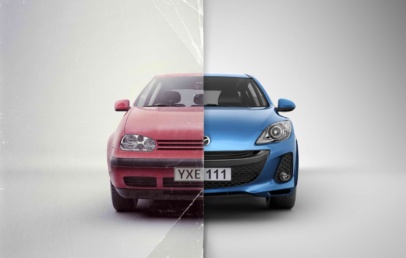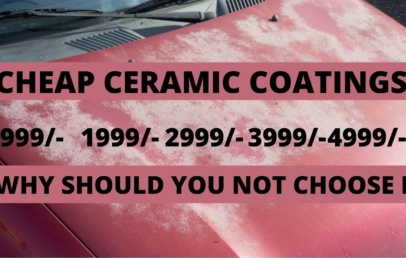Is it any good to apply a ceramic coating on your own?

With the recent boom in detailing and coatings, many car owners are considering taking the Do It Yourself (DIY) route.
In this article, we are going to discuss whether DIY coatings are worth your time and energy and most importantly the RISK, if you do choose to do it yourself, what are some things you need to be aware of, and what’s our take on it.
What are DIY coatings?

DIY coatings are entry-level low concentrate, easy wipe on and wipe off coatings offered by certain manufacturers/traders.
They are substantially lower in quality and concentration than their professional-grade counterparts but are easier to apply and user-friendly making them ideal for DIY applications. These coatings are cheap which makes them attractive for people who want to coat their vehicles without taking it to a professional detailer.
Are they worth it?
Not all coatings are the same
There is a reason professional-grade coatings are sold only to certified professionals. They are highly concentrated and are synthesised using very strong chemicals. Professional grade coatings require specific conditions to work properly and one wrong move can inflict that is difficult or almost impossible to rectify. DIY coatings are often more forgiving and have longer flash-off times giving you the freedom to remove any defects like coating high spots or streaks or haze before it cures.
Some professional coatings like the Maxprotect UNCR and Pro-Elite, CQ Finest Reserve, CQ Professional, Ceramic Pro require very specific temperatures and application techniques which makes them not DIY friendly, but these are some of the best automotive protective coatings out there in the world. If quality is what you’re after, then DIY coatings aren’t for you.
Preparation before the coating
In some of our previous articles, we’ve talked about how important preparation is. Preparation lays the groundwork for how the end result is going to be. Contrary to popular belief, the coating does not provide any additional gloss or shine. The increased gloss and shine comes from good preparation and correction of the surface. If a person is considering DIY coatings as a cheaper alternative, they are unlikely to invest in the tools and chemicals required for good preparation. Improper preparation leads to ineffectiveness of the coating, premature wear, reduced protection. If you coat a vehicle with a lot of contaminants and swirls, you will be locking them in with the coating. For a good coating job, preparation is key.
One coating for the entire vehicle
Different materials and finishes require the use of coatings that are meant for that surface. Applying a coating on the surface they are meant for lets them work their magic effectively and more importantly not negatively affect the surface. Professional detailers use dedicated coatings on dedicated surfaces, it doesn’t make financial sense to buy a bottle of each type of coating for a one-time application.
End Result after the coating application
Now let’s address the elephant in the room, the result. It is very difficult to match the level of consistency and output of a professional detailer. But DIYing isn’t about getting it perfect, it’s about the satisfaction of having done it yourself. What we are trying to say is, you can’t expect the same output when using an off-the-shelf product and doing it yourself and compare the results with a pro.
Things you need to be aware of
More important than doing it right, is not to do it wrong. In recent times, we’ve had to correct a lot of “DIY Detailing gone wrong” cases. In the example below, a Tata Harrier Dark edition received a DIY coating job.
The application was inconsistent with a lot of high spots and streaks. The customer had applied the coating and let it sit for a long time. This hardened the coating, leaving no other option but to use very abrasive chemicals and materials to remove the coating layer. Of course, we are always here to help our customers. But please don’t make things worse for yourself. Sometimes you would end up spending more on fixing a bad application than getting it done professionally the first time. So, its better to stay away from DIY Coatings that are sold on Amazon, Flipkart etc.

Are there any good alternatives?
If trying to save a few bucks is what you’re after, then you would want to check out some sort of spray sealant or a spray-on-ceramic. In no way do these options come close to a professional coating application, but these do give you some protection and hydrophobic properties that are often short-lived. It is really difficult to mess up the application of these types of products, you would be reducing the risk of damage to the surface if improperly applied.
Now, should you do it…
This is hard to answer. If you’re aware and are willing to take the risk of damage, have done ample research on the subject, consulted someone working in the field for product and procedure recommendations. Then more power to you, a well-executed detailing and coating job hits different when you do it on your own. If not, then getting it done by a professional is the safer bet. As you wouldn’t risk damaging the paint, and the coating will last you a long time and do its job effectively.
An example of DIY coating gone wrong.

Another closeup example of a DIY coating tried/experimented through Youtube Preachers gone wrong.

An example of a result from a Professional.

Conclusion:
Applying ceramic coating to your car yourself is a possibility, but it is important to consider the following reasons why seeking professional assistance is often recommended:
-
Technical Skill and Expertise: The successful application of ceramic coating requires a certain level of technical skill and expertise. Professional detailers possess the necessary knowledge and experience to execute the coating process effectively, ensuring precise and uniform coverage while minimizing the risk of errors.
-
Surface Preparation and Paint Correction: Prior to applying ceramic coating, meticulous surface preparation is crucial. This involves thorough cleaning, decontamination, and paint correction to eliminate imperfections. Professional detailers possess the specialized tools and techniques required to adequately prepare the paint surface, optimizing the bonding and longevity of the coating.
-
Product Selection: Professional detailers have access to a wide array of high-quality ceramic coating products. They possess the expertise to select the most suitable coating based on factors such as durability, gloss enhancement, hydrophobic properties, and ease of maintenance, ensuring an optimal coating solution for your specific requirements.
-
Specialized Equipment and Controlled Environments: Professional detailers are equipped with specialized tools, such as polishers and infrared curing lamps, which facilitate superior results during the coating application. Additionally, they operate in controlled environments, such as dedicated detailing bays, ensuring optimal conditions for the coating process.
-
Warranty and Guarantee: Many professional detailers offer warranties or guarantees on their ceramic coating services, providing added reassurance. This means that if any issues arise with the coating, you can have them rectified by the professionals, offering you peace of mind.
It is important to recognize that the process of applying ceramic coating can be intricate, and improper application may result in uneven coverage, streaks, or other aesthetic complications. If you possess limited experience or uncertainties regarding the process, it is advisable to consult a professional detailer who can provide the technical expertise required to achieve optimal results for your car.
Disclaimer : The content provided on this blog by Torquoholic is intended for informational purposes only. The views and opinions expressed herein are those of the individual authors and do not necessarily reflect the official policy or position of Torquoholic as a whole.
Some content posted on this blog is created by Torquoholic's team, while other content is derived from various sources on the internet, books, discussions, and knowledge sharing by industry professionals. While we strive to ensure the accuracy and reliability of the information provided, we cannot guarantee its completeness or timeliness.
The information presented on this blog is based on our personal research and understanding of the topic at hand. It should not be interpreted as a comprehensive education on the subject matter. Readers are encouraged to conduct their own research and consult with relevant professionals for specific advice or information.
Torquoholic shall not be held liable for any errors, omissions, or inaccuracies in the content provided on this blog, nor for any actions taken in reliance thereon. We disclaim any responsibility for the content of external websites linked to from this blog.
By accessing and using this blog, you agree to indemnify and hold Torquoholic and its authors harmless from any claims, damages, or losses arising from your use of the information provided herein.
Thank you for your understanding and continued support.




